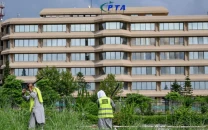Cabinet approves tough law against rape
Shibli says new law carries death sentence and will be finalised within a week

The federal cabinet approved on Tuesday in principle the Anti-Rape (Investigation and Trial) Ordinance, 2020, and the Pakistan Penal Code (Amendment) Ordinance, 2020, while taking a stern notice of rising crimes against children and women.
Expressing sorrow and grief over the rape of a women and her daughter in Kashmore, Sindh, Prime Minister Imran Khan directed the law ministry and departments concerned to finalise the proposed laws as quickly as possible and leave no lacunae that could lead to providing relief to accused. “Such crimes are not tolerated in any civilised society,” Imran told the weekly cabinet meeting.
Admitting that the rape cases were on the rise in the country, Information Minister Shibli Faraz told the post-cabinet meeting press conference that the cabinet deliberated on the ordinances that were being prepared on the direction of the prime minister.
Shibli said that the prime minister had directed the law ministry to prepare an ordinance, carrying severe punishments for the rapists and ensuring that they did not go scot-free due to the inaccuracies in the laws. “Gang-rape has been included in it,” Shibli said. “The [proposed] law would prove to be an effective deterrent.”
Though some ministers have long been saying that the new anti-rape law would carry punishment of chemical castration of rapists but the information minister refrained from using the words, saying he did not want to use any words that are later on not part of the ordinance.
Shibli, however, said that the proposed law carried death sentence, adding the Law and Justice Minister Barrister Faroogh Naseem was busy fine-tuning the ordinance, adding that it was expected that he would finalise it within a week.
Following the discussion on the ordinances, Naseem briefed the cabinet on the laws pertaining to the appointment of the parliament members on the boards of directors of government Institutions. After deliberation, the cabinet decided to seek guidance from the Supreme Court in this regard.
The government would seek guidance from the apex court in line with the ruling in 2016 Mustafa Impex Case, Shibli said. He added that the judgment had stated that the prime minister in his capacity as the chief executive of the country executed policy decisions but did not take them by himself without consulting and obtaining approval from the cabinet.
Meanwhile, the Economic Affairs Division informed the cabinet that at present repayment of $1.7 billion to $2 billion in loans extended by the G-20 countries to Pakistan from May to December 2020 had been delayed due to the coronavirus pandemic.
The decision of deferring the repayment of the loan will be effective until June 2021. Subsequently, the cabinet authorised the economic affairs division secretary to enter into debt rescheduling agreements with 16 members of G-20 countries.
The cabinet also approved in principle the establishment of the Special Technology Zones Authority for the promotion of technology in the country. The special technology zones will initially be set up in Peshawar, Islamabad, Lahore and Haripur. The cabinet also approved the establishment of such zones in Karachi and Quetta.
The prime minister said that there was a huge potential for information technology (IT) in Pakistan, which must be harnessed, adding that the information technology was a stepping stone to the development in the modern times. He directed for creating 50 technology zones across the country.
At the post-cabinet press briefing, Industries and Production Minister Hammad Azhar and Economic Affairs Minister Khusro Bakhtiar said that sugar, wheat and flour prices had gone down and would further reduce in the coming days.
Also, while offering condolences on the demise of the mother of the former prime minister Nawaz Sharif and former Punjab chief minister Shehbaz Sharif, Shibli said that there were no restrictions on the Sharifs and others to come back and attend her funeral.
“The government’s stance is very clear on it,” Shibli said, adding the government had not stopped Sharif, his sons or the former finance minister Ishaq Dar. While answering a question regarding Saudi-Israel relations, Shibli said that Pakistan’s stance on Kashmir and Palestine remains unchanged.
In addition, the official statement issued after cabinet meeting stated that the cabinet endorsed the decisions taken in the meetings of the Committee on Institutional Reforms held on October 29 and November 12, 2020.
Besides, the cabinet was given a progress report on the appointment of chief executive officers (CEOs) and managing directors to the vacant posts in government agencies. Prime Minister Imran directed for completing the process as soon as possible.
The cabinet approved the appointment of the director general of the national archives. It also allowed the Ministry of Commerce to issue NOCs for the payments to the international TV channels in respect of sports broadcasts on the Pakistan Television.
The cabinet approved the appointments to the board of governors and of the managing director of the National Book Foundation. It also referred the amendments to the Civil Aviation Rules 1991 to the cabinet committee on law.
The cabinet ratified the decisions taken at the meeting of the Economic Coordination Committee held on 16 November 2020 and the decisions taken at the meeting of the Energy Committee held on 19 November 2020. During the meeting, Planning Minister Asad Umar gave a briefing on the improvement in key economic indicators.

















COMMENTS
Comments are moderated and generally will be posted if they are on-topic and not abusive.
For more information, please see our Comments FAQ